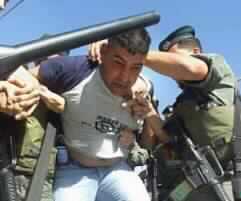HIGHLIGHTS: Palestinians Clash with Israeli Police in East Jerusalem||First Segment of Security Fence 110 KMS LongGerman Mediators on the Move to Facilitate a Prisoners of War Swap Between Hizbollah & Israel|| STORY: In East Jerusalem, and for the second time in as many days, dozens of Palestinians pelted Israeli police with stones Sunday at the construction site of a new Jewish neighborhood in the center of the southeastern Jerusalem Arab village of Jabel Mukaber. (Read photo caption)
Two border policemen were injured before the rioters were dispersed. One of the demonstrators was also arrested. Work began at the site last week for the construction of a new Jewish neighborhood on allegedly privately owned land that was purchased over the last three decades. Some Palestinians residents say a small portion of the land, including an olive grove, belongs to them.
WORK TO BEGIN ON SO-CALLED GREENLINE SECURITY FENCE
Israeli Defense Ministry sources meanwhile said that work is to begin this week on the first segment of the security fence to be built along the so-called Green Line.
The 110 km.-long fence from Megiddo to the Trans-Samarian Highway would be "continuous" and would be completed within 10 months to a year.
The Knesset State Control Committee met Sunday to hear from the defense establishment on its implementation of government decisions on establishing the fence.
Committee chairman Amnon Rubinstein (Meretz), who initiated the discussion, said that every day that passes without a fence along the Green Line is causing a loss of lives.
The total length of the fence needed along the Green Line, including around Jerusalem, is some 450 km., and each kilometer of the fence is to cost NIS 4 million, including electronic devices, Yaron said.
Leaders of communities to the north and south of the first segment of the fence warned that Resistance activity would now move to their areas.
However, Yaron said the aim is to first focus on the main population centers.
The purpose of the fence , according to Israeli sources, is to block the entry into Israel of Palestinian Resistance bombers and unauthorized persons and prevent thefts. Gates are also to be established under the project.
ISRAEL HANDS OVER A HIZBOLLAH PRISONER
Israel handed over a Hizbullah prisoner on Monday, amid reports that a deal was reached via German mediators for the goodwill gesture to be followed by a prisoner swap with the Lebanese group, media reports said.
Israel Radio identified the freed prisoner as Mohammad Abbas al-Barazawi, 39. Earlier reports said he was apparently being released for humanitarian reasons, because he is ill.
Al Barazawi was taken to the Rosh Hanikra border crossing with Lebanon and then to the other side of the frontier, the radio said.
Israeli occupation army officials had no immediate comment on the report.
Al Barazawi was captured during a December 4, 1987 IDF operation against Hizbullah. Two Hizbullah men were killed in the clash.
Earlier, news media reports suggested that a deal had been struck via German negotiators for al-Barazawi's release to be part of a wider prisoner exchange.
Last week Israel appointed a commission under retired judge Eliahu Winograd to investigate what happened to one of its missing soldiers, Ron Arad, an air navigator who disappeared after his plane was downed in Lebanon in 1986.
Arad is one of at least four Israelis missing in action in Lebanon, including three who disappeared after a battle in Sultan Yakoub in Lebanon in 1982. Hizbullah reportedly kidnapped another Israeli, Elhanan Tannenbaum, while traveling to Europe.
Three other soldiers captured on the Israeli border with Lebanon in 2000 are believed dead, but their bodies have not been recovered.
The abduction took place in a disputed area on the border.
PHOTO CAPTION
Israeli policemen wrestle a Palestinian protestor who along with other Palestinian citizens tried to prevent Israeli construction workers from starting to build a project on Palestinian owned land in east Jerusalem June 10, 2002. Palestinians say they have papers to prove the land belongs to them and will go to court, underscoring the sensitivities over contested land ownership in the Israeli-Palestinian conflict. (Yannis Behrakis/Reuters)
- Author:
& News Agencies - Section:
WORLD HEADLINES


 Home
Home Discover Islam
Discover Islam Quran Recitations
Quran Recitations Lectures
Lectures
 Fatwa
Fatwa Articles
Articles Fiqh
Fiqh E-Books
E-Books Boys & Girls
Boys & Girls  Hajj Rulings
Hajj Rulings Hajj Fatwas
Hajj Fatwas














